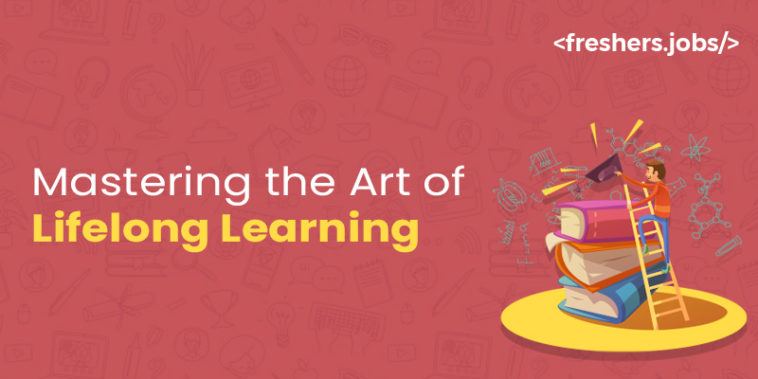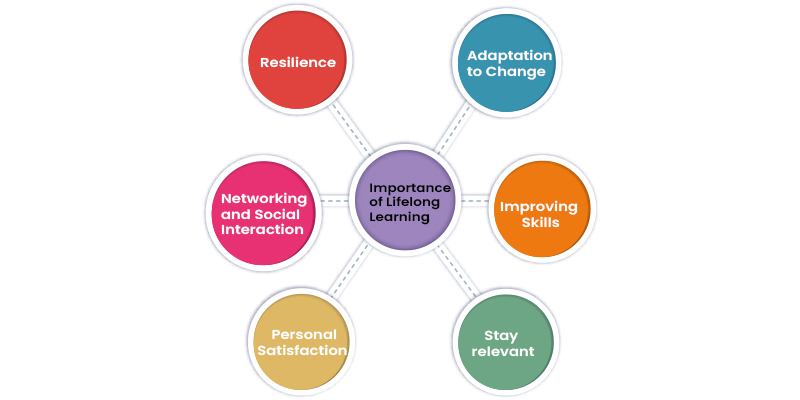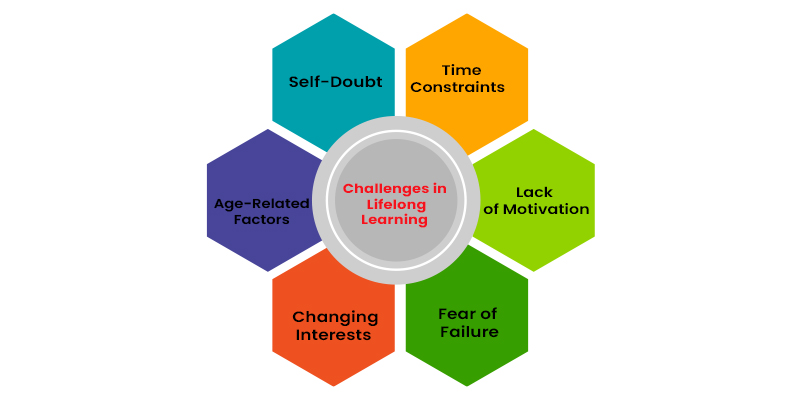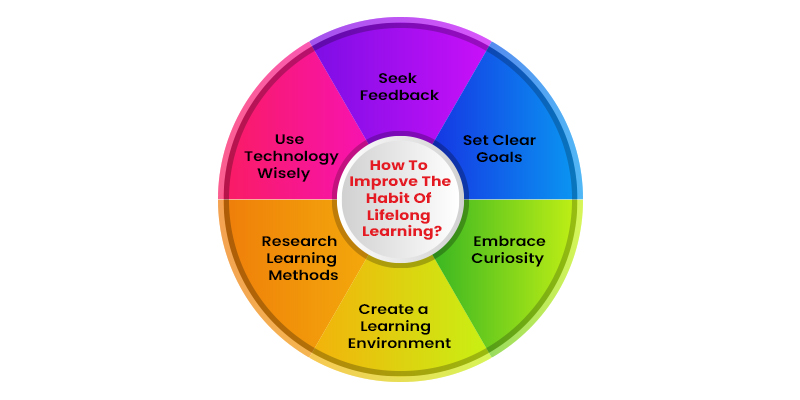In a world of rapid technological advancements, the gaining of knowledge has become an essential aspect of personal and professional growth for freshers jobs seeking graduates. The ability to adapt, adjust, learn, and innovate has become a very vital aspect of career advancement.
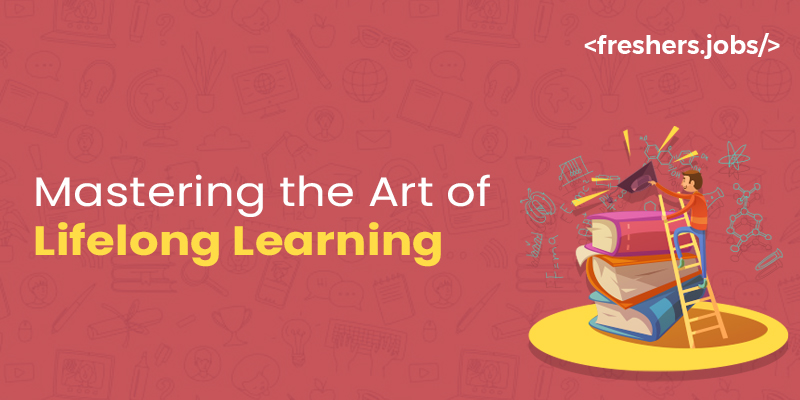
The concept of learning goes beyond formal education and extends to a lifelong journey of discovery and improvement. In this blog, we will delve into the learning ways, the importance of lifelong learning, its benefits, and challenges.
What is Lifelong Learning?
Lifelong learning is defined as the continuous process of acquiring knowledge, skills, and personal development throughout one’s entire life. It includes the process of gathering new information, adapting to changing circumstances, and enhancing an individual’s abilities beyond formal education. Lifelong learning involves a wide range of activities, including formal education, informal learning experiences, self-directed study, online courses, workshops, seminars, reading, and any other means through which individuals actively engage in expanding their knowledge and capabilities.
Importance of Lifelong Learning
Listed below are the importance of Lifelong learning.
- Adaptation to Change: In today’s constantly evolving world, technologies, industries, and societal norms are facing several changes. Lifelong learning allows individuals to stay up-to-date with these changes and adapt to new circumstances, thereby enhancing their employability and personal effectiveness.
- Personal Growth: Lifelong learning also contributes to personal growth and self-discovery. It allows individuals to explore new subjects, hobbies, and interests, promoting a sense of fulfillment and expanding their career paths beyond their comfort zones.
- Improving Skills: Continuous learning guides individuals in acquiring new skills or improving existing ones. This is essential for career growth and professional development. Acquiring new skills and knowledge can open doors for new job opportunities for career advancement and increase an individual’s value in the job market.
- Intellectual Improvement: If you continuously learn new things, it will help you to keep your mind sharp and active. Lifelong learning encourages creativity, problem-solving skills, and critical thinking, which are considered to be very important aspects of work, relationships, and personal growth.
- Stay relevant: It’s really important to keep up with how things are changing in the work world. Knowing about the jobs and what employers want from workers can help you to learn relevant skills to land your first job. Learning new things throughout your life helps you stay competitive and able to change along with the job market. This way, you’ll always stay updated in the field you want to work in.
- Personal Satisfaction: Achieving your goals, whether big or small, can lead to a sense of accomplishment and personal satisfaction. It boosts self-confidence and self-esteem, contributing to overall well-being.
- Cognitive Health: When you learn continuously, your brain gets active and flexible, which might help you keep your thinking skills strong even as you age.
- Networking and Social Interaction: Lifelong learning often involves making relationships and interacting with others who share similar interests. This creates opportunities for networking, building social connections, and expanding one’s circle of acquaintances.
- Global Awareness: Learning about diverse cultures, perspectives, and global issues promotes cultural awareness and a broader understanding of the world. This is particularly important in a society where interactions with people from various backgrounds are common.
- Resilience: Learning continuously includes patience and effort. Overcoming challenges and excelling in new skills through a continuous learning process can promote resilience and mind and growth of mindset.
Are you looking for any job opportunities in Lucknow? Then look for job openings available in that city. Click on fresher job openings in Lucknow to find job opportunities that align with your skills and interests.
Challenges in Lifelong Learning
Listed below are some challenges faced by individuals in learning continuously.
- Time Constraints: Balancing the time for learning with work, family, and other responsibilities can be tough. Finding the time to engage in learning activities can be a challenge, especially for people with busy schedules.
- Financial Issues: Some forms of learning, such as formal education or professional training, can be expensive. Financial limitations may restrict access to certain learning opportunities. Tackling the financial issues and learning at the same time can be challenging.
- Lack of Motivation: Motivation plays a vital role in Continuous learning. Sustaining motivation for continuous learning over an extended period can be difficult. Without a clear goal or interest, individuals might struggle to stay committed.
- Technological Barriers: As many learning resources are now online, individuals who lack access to the internet or struggle with technology may find it challenging to participate in online courses or use digital learning platforms.
- Learning Styles: Every individual has a different way to learn new things. Finding the learning methods that work best for an individual’s learning style can be a Challenge. Some people might struggle with self-directed learning, while others might not thrive in classroom settings.
- Fear of Failure: Trying new things and learning will definitely lead to making mistakes. The fear of failure or not being good enough can stop individuals from stepping out of their comfort zones.
- Information Overload: In the age of the internet, there’s an abundance of information available. Filtering through this vast amount of information to find relevant and accurate resources can be overwhelming.
- Changing Interests: Some people can feel that their interest is getting faded over the subject they are learning currently. Staying committed to learning about a subject that no longer excites them can be challenging.
- Social Support: A lack of encouragement and support from friends, family, or colleagues can make the learning journey more difficult. Having a supportive environment can significantly impact one’s ability to continue learning.
- Age-Related Factors: As individuals age, they might face cognitive changes, such as difficulties in memorizing things, etc, that make learning certain subjects more challenging. This can lead to frustration and discourage further learning.
- Self-Doubt: Feeling inadequate or doubting one’s ability to learn new things can hinder progress. Overcoming self-doubt is very important for successful lifelong learning because it allows individuals to overcome challenges, believe in their abilities, and maintain the confidence level needed to explore unfamiliar topics and grow continuously.
Benefits of Lifelong Learning
These are the pros of the Lifelong learning process.
- Career Advancement: Continuous learning enhances employability, making individuals more adaptable to changing job requirements and more attractive to employers seeking skilled and knowledgeable professionals.
- Increased Confidence: Mastering new subjects or skills boosts self-confidence and self-esteem, positively influencing one’s approach to challenges and new experiences, in which each accomplishment increases the courage to take on even greater challenges.
- Problem-Solving Skills: Learning exposes individuals and helps them to adapt to various scenarios and challenges, enhancing their ability to analyze situations and find effective problem-solving solutions.
- Enhanced Communication: Learning different subjects improves communication skills, enabling individuals to effectively convey their ideas and thoughts to others.
- Reduced Isolation: Engaging in learning activities, whether online or in person, can help individuals stay connected with people and prevent them from feeling lonely. This will help them to make a lot of professional connections too.
- Improved Decision-Making: The Learning process exposes individuals to diverse perspectives, helping them make informed and well-rounded decisions. This will help them to analyze things and make decisions according to the situation.
- Contributions to Society: Lifelong learners will often share their knowledge and expertise with others, positively impacting their communities and society at large.
TCS offers various job opportunities for freshers. Candidates can visit TCS Jobs For Freshers to look for job vacancies that are relevant to their skills and abilities.
How to improve the habit of Lifelong Learning?
Improving the habit of lifelong learning requires intentional effort and a willingness to embrace continuous personal growth. The following points are tips for how to enhance the habit of Continuous learning.
- Set Clear Goals: Define what you want to learn and the reason why you want to learn it. Having specific goals gives your learning a purpose and helps you stay motivated, guiding your efforts with a sense of direction and ensuring a sense of accomplishment as you progress towards your desired outcomes.
- Embrace Curiosity: Have a curious mindset, ask questions, explore new topics and things, and seek out information if it is related to your current interests, enhancing your interest in lifelong learning and gaining knowledge that continuously expands your career path.
- Allocate Time: Dedicate a regular time schedule for learning. Treat it like any other important commitment in your schedule, and you can see those consistent efforts enhance your significant intellectual achievements and personal development over time.
- Create a Learning Environment: An individual needs a calm and peaceful environment for learning. It could be a local library or an online platform with educational resources that can be accessed from one’s home, ensuring every condition for an individual to absorb knowledge.
- Start Small: Begin with manageable learning tasks. Over time, you can gradually increase the complexity and depth of your learning activities, building a strong foundation and gaining confidence as you delve deeper into your chosen subjects.
- Research Learning Methods: Experiment with various learning methods. Read books, take online courses, attend workshops, engage in discussions, and watch educational videos. The knowledge you acquire through these learning methods can be very helpful for your Career Advancement.
- Use Technology Wisely: Make use of online resources, educational apps, and platforms to access a wide range of information and learning opportunities, promoting personal growth and expanding your knowledge.
- Take Notes and Reflect: Note down key points during your learning process and take time to recall and reflect on what you’ve learned. This reinforces your understanding and helps you retain that information in your memory..
- Stay Consistent: Consistency is a very important factor in Continuous learning. Make learning a regular habit to ensure steady progress over time, and you’ll find that your commitment to learning becomes an integral part of your daily routine, leading to meaningful personal and professional development.
- Seek Feedback: Share your learning experiences with others and seek feedback. Engaging in discussions and receiving input can deepen your understanding and help you to analyze your knowledge and skills.
In conclusion, mastering the art of lifelong learning is a transformative journey which is a key factor in enhancing your personal growth, professional success, and leads to a fulfilled life. Continuous learning is really very beneficial, which helps in adapting to changes and decision-making, problem-solving, enhancing our skills, Increasing confidence, Career Development, etc., in our ever-evolving world to promote intellectual stimulation and cognitive well-being. In this blog, we explore what is Lifelong learning, its importance, challenges, benefits, and tips for how you can enhance the learning ways.

